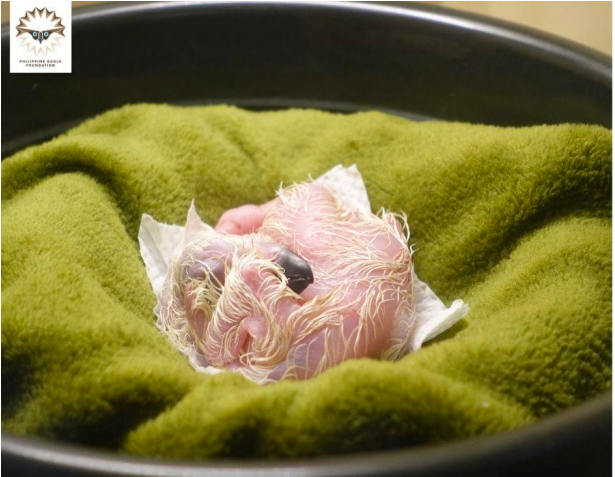THE PHILIPPINE Eagle Foundation (PEF) is thrilled to announce the successful hatching of Philippine Eagle Chick #30 at the newly established National Bird Breeding Sanctuary (NBBS) in Eden, Toril on Nov. 11, 2024.
This momentous event signifies a major milestone for Philippine Eagle conservation and represents the first successful hatching at the facility, which only began operations months ago.
The chick, which hatched following a 56-day incubation period, owes its survival to a critical intervention by PEF’s dedicated team. The “help out” method, involving assisted pipping through air space areas of the egg where the membrane was unattached, was employed to prevent suffocation from excess carbon buildup—a common risk when the hatching period extends beyond a safe duration.
“The decision to use the ‘help out’ method was not made lightly,” explained Domingo Tadena, NBBS facility manager and PEF’s conservation breeding expert. “It was a calculated measure based on years of experience and the chick’s status during the later stages of incubation. Without our intervention, the risk of losing this hatching to suffocation was high. This chick’s survival represents not just a successful breeding cycle,” he added.
The chick is a product of cooperative artificial insemination, with its parents being Pinpin, the female eagle who naturally incubated the egg for the first seven days, and Sinag, the semen donor who resides at the Philippine Eagle Center (PEC). The breeding season, which began in July with vocal displays from the eagles, entered an intensive phase in August, leading to the laying of the egg on Sept. 16. Advanced equipment donated by Liberec Zoo in the Czech Republic played a key role in providing optimal incubation conditions.
“This hatching marks a historic first for the NBBS, occurring just months after its establishment,” Tadena continued. “It proves that with cutting-edge technology, cross-cultural collaboration, and unwavering dedication, we can create new hope for the Philippine Eagle and ensure that future generations,” he added.
Chick #30 represents a new chapter in the fight to conserve the Philippine Eagle, a species found only in the Philippines and facing critical threats from habitat loss and hunting. The NBBS will continue to provide a safe environment for the chick’s growth and development, offering new opportunities for the species’ recovery and long-term survival.
“This achievement underscores the unique challenges faced by specialists in breeding our National Bird. They are not only difficult to pair but they also only mature and become productive after a long time. One necessarily needs to invest time and resources to make it work. But more importantly, besides skill, knowledge and experience, it is the dedication and passion of our team that made this possible,” Dennis Salvador, PEF’s executive director stressed. “We are deeply grateful to everyone who helped and continues to invest in our common mission,” he added.
Thanks to our dedicated partners, Boysen Philippines and Philippine Airlines, for adopting Pin-pin and Sinag, respectively.
In a statement, Boysen reaffirms their commitment to helping the PEF in its conservation mission.
“For several years, we have proudly supported the Philippine Eagle Foundation through our adoption of Pin-pin. Seeing her contribute to the successful hatching of Chick #30 reaffirms our commitment to protecting this majestic species. We believe in the power of conservation partnerships, and we are honored to play a part in PEF’s tireless efforts to secure a future for the Philippine Eagle,” Justin C. Ongsue, VP for sales and operations, said.

